Ford Puma vs Lexus UX - Differences and prices compared
Costs and Efficiency:
When it comes to price and running costs, the biggest differences usually appear. This is often where you see which car fits your budget better in the long run.
Ford Puma has a significantly advantage in terms of price – it starts at 24800 £, while the Lexus UX costs 37900 £. That’s a price difference of around 13157 £.
Fuel consumption also shows a difference: Lexus UX manages with 5 L and is therefore slight more efficient than the Ford Puma with 5.40 L. The difference is about 0.40 L per 100 km.
Engine and Performance:
Power, torque and acceleration say a lot about how a car feels on the road. This is where you see which model delivers more driving dynamics.
When it comes to engine power, the Lexus UX has a to a small extent edge – offering 199 HP compared to 168 HP. That’s roughly 31 HP more horsepower.
In acceleration from 0 to 100 km/h, the Ford Puma is slight quicker – completing the sprint in 7.40 s, while the Lexus UX takes 7.90 s. That’s about 0.50 s faster.
In terms of top speed, the Ford Puma performs slightly better – reaching 210 km/h, while the Lexus UX tops out at 177 km/h. The difference is around 33 km/h.
Space and Everyday Use:
Beyond pure performance, interior space and usability matter most in daily life. This is where you see which car is more practical and versatile.
Seats: offers more seating capacity – vs .
In curb weight, Ford Puma is slightly lighter – 1316 kg compared to 1495 kg. The difference is around 179 kg.
In terms of boot space, the Ford Puma offers clearly perceptible more room – 523 L compared to 320 L. That’s a difference of about 203 L.
In maximum load capacity, the Ford Puma performs slight better – up to 1283 L, which is about 52 L more than the Lexus UX.
When it comes to payload, Lexus UX noticeable takes the win – 615 kg compared to 469 kg. That’s a difference of about 146 kg.
Who comes out on top?
Overall, the Ford Puma shows itself to be outperforms in nearly all aspects and secures the title of DriveDuel Champion.
It convinces with the more balanced overall package and proves to be the more versatile choice for everyday use.
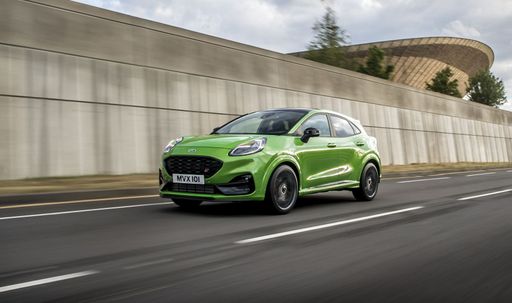 @ Ford Motor Company / Ford Media Center
@ Ford Motor Company / Ford Media Center
Ford Puma
Costs and Consumption
View detailed analysis
Engine and Performance
View detailed analysis
Dimensions and Body
View detailed analysis
Ford Puma
The Ford Puma is a cheeky compact crossover that blends sporty styling with city-friendly practicality, giving drivers a surprisingly fun and composed ride. With clever storage tricks and a lively personality, it’s a smart pick for buyers who want enjoyment without fuss.
details @ Ford Motor Company / Ford Media Center
@ Ford Motor Company / Ford Media Center
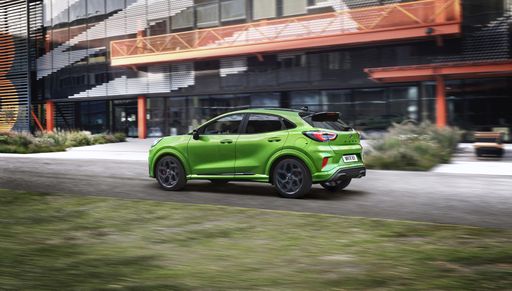 @ Ford Motor Company / Ford Media Center
@ Ford Motor Company / Ford Media Center
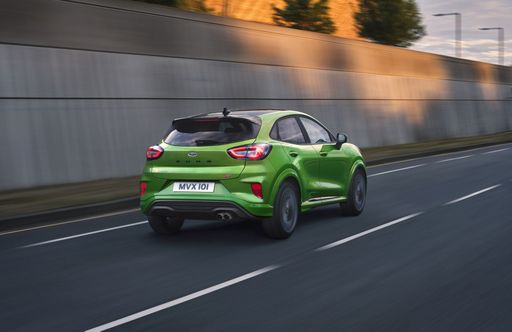 @ Ford Motor Company / Ford Media Center
@ Ford Motor Company / Ford Media Center
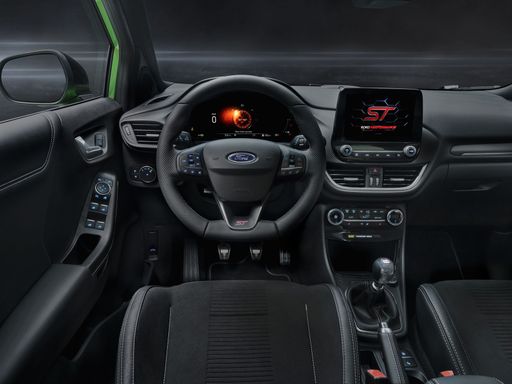 @ Ford Motor Company / Ford Media Center
@ Ford Motor Company / Ford Media Center
Lexus UX
The Lexus UX is a compact luxury crossover that blends sharp styling with a quiet, comfortable cabin, perfect for urban buyers who want premium feel without shouting about it. It rides with poise, serves up plush materials and thoughtful tech, and—while it won’t satisfy anyone chasing track thrills—it's a smart, stylish choice for everyday driving.
details @ Lexus / Toyota Motor Corporation
@ Lexus / Toyota Motor Corporation
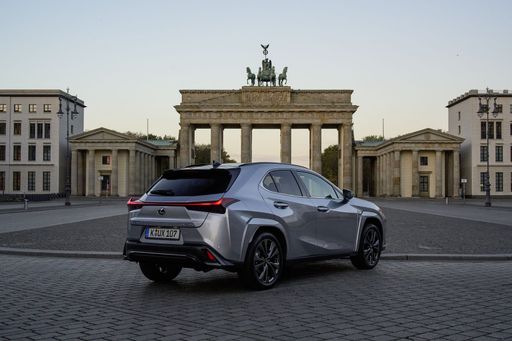 @ Lexus / Toyota Motor Corporation
@ Lexus / Toyota Motor Corporation
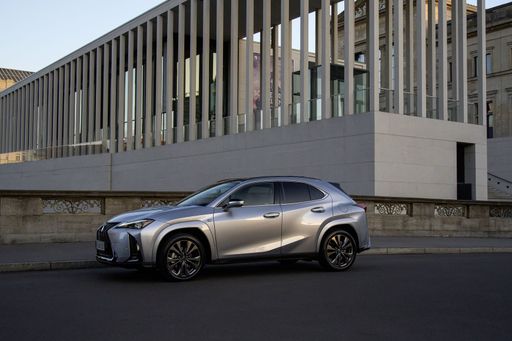 @ Lexus / Toyota Motor Corporation
@ Lexus / Toyota Motor Corporation
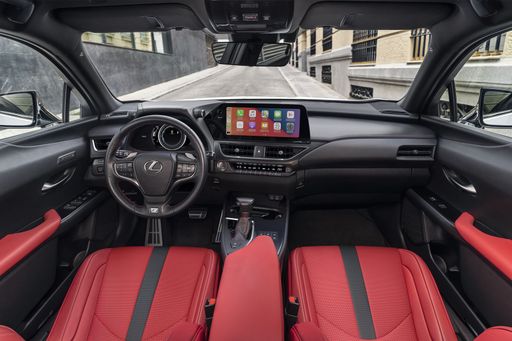 @ Lexus / Toyota Motor Corporation
@ Lexus / Toyota Motor Corporation
 @ Ford Motor Company / Ford Media Center
@ Ford Motor Company / Ford Media Center
|
 @ Lexus / Toyota Motor Corporation
@ Lexus / Toyota Motor Corporation
|
|
|
|
Costs and Consumption |
|
|---|---|
|
Price
24800 - 36300 £
|
Price
37900 - 54100 £
|
|
Consumption L/100km
5.4 - 5.9 L
|
Consumption L/100km
5 - 5.6 L
|
|
Consumption kWh/100km
13.1 - 13.9 kWh
|
Consumption kWh/100km
-
|
|
Electric Range
361 - 376 km
|
Electric Range
-
|
|
Battery Capacity
43 kWh
|
Battery Capacity
-
|
|
co2
0 - 135 g/km
|
co2
113 - 127 g/km
|
|
Fuel tank capacity
42 L
|
Fuel tank capacity
43 L
|
Dimensions and Body |
|
|---|---|
|
Body Type
SUV
|
Body Type
SUV
|
|
Seats
5
|
Seats
5
|
|
Doors
5
|
Doors
5
|
|
Curb weight
1316 - 1563 kg
|
Curb weight
1495 - 1555 kg
|
|
Trunk capacity
456 - 523 L
|
Trunk capacity
283 - 320 L
|
|
Length
4186 - 4226 mm
|
Length
4495 mm
|
|
Width
1805 mm
|
Width
1840 mm
|
|
Height
1550 - 1555 mm
|
Height
1540 mm
|
|
Max trunk capacity
1216 - 1283 L
|
Max trunk capacity
1194 - 1231 L
|
|
Payload
367 - 469 kg
|
Payload
555 - 615 kg
|
Engine and Performance |
|
|---|---|
|
Engine Type
Electric, Petrol MHEV
|
Engine Type
Full Hybrid
|
|
Transmission
Automatic, Manuel
|
Transmission
Automatic
|
|
Transmission Detail
Reduction Gearbox, Manual Gearbox, Dual-Clutch Automatic
|
Transmission Detail
CVT
|
|
Drive Type
Front-Wheel Drive
|
Drive Type
Front-Wheel Drive, All-Wheel Drive
|
|
Power HP
125 - 168 HP
|
Power HP
199 HP
|
|
Acceleration 0-100km/h
7.4 - 9.8 s
|
Acceleration 0-100km/h
7.9 - 8.1 s
|
|
Max Speed
160 - 210 km/h
|
Max Speed
177 km/h
|
|
Torque
170 - 290 Nm
|
Torque
-
|
|
Number of Cylinders
3
|
Number of Cylinders
4
|
|
Power kW
92 - 124 kW
|
Power kW
146 kW
|
|
Engine capacity
999 cm3
|
Engine capacity
1987 cm3
|
General |
|
|---|---|
|
Model Year
2025
|
Model Year
2025
|
|
CO2 Efficiency Class
A, D
|
CO2 Efficiency Class
C, D
|
|
Brand
Ford
|
Brand
Lexus
|
Is the Ford Puma offered with different drivetrains?
The Ford Puma is offered with Front-Wheel Drive.
The prices and data displayed are estimates based on German list prices and may vary by country. This information is not legally binding.
